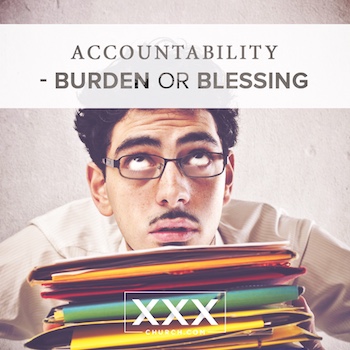 I once had a conversation with Craig Gross about the word “accountability,” mainly because he wrote a book with Adam Palmer on the subject a few years ago called Open. It was about the benefits of vulnerability and placing yourself in relationship with people who could speak the truth to you when you needed to hear it the most.
I once had a conversation with Craig Gross about the word “accountability,” mainly because he wrote a book with Adam Palmer on the subject a few years ago called Open. It was about the benefits of vulnerability and placing yourself in relationship with people who could speak the truth to you when you needed to hear it the most.
During this conversation, I shared the results of a quick, unscientific poll, where I asked several people, all Christians, what came to mind (and what they felt) as soon as they heard the word “accountability.” Most of the answers were something akin to, “It means you give someone permission to condemn you or tell you when you screw up.”
None of the people I asked had much to say that was positive about their experience of the word, and though I realize it was a pretty small sample group, the point they made was a legitimate one. “Accountability” as it has been used (and abused) in the Christian Church seems to be more of a problem word than anything else – but we still insist on using it, especially as it pertains to porn/sex addiction. Why?
Craig’s answer was simple: he said that the word had been “hijacked.”
I agree – the term had been co-opted by some sort of religious element in the church and was usually experienced as some sort of license to condemn. But Craig felt a need to redeem the word – which is a difficult task because of how fast culture shifts. But if we are to redeem that word, we have to start in this space of porn/sex addiction – the place where accountability is needed most.
We all know that the best element of this idea is this: a trusted friend comes to you when they see you struggle. They do this bearing unconditional love, vulnerability, and honesty without judgment. They respect your sovereignty, but also honor the trust you’ve placed in them and their perspective, so they aren’t afraid to bring it. We all know that this type of relationship is a sacred thing, and is usually built over many years of walking in the trenches together. It can’t be manufactured artificially. The great philosopher Martin Buber called this the I-Thou relationship – the type of relationship where a presence exists between two people that is inhabited by what Buber called the “Eternal Thou.” My reading of Buber puts the resurrected Christ in that space. Where grace abounds between two people, we see redemption and new creation.
Buber also talked about the other kind of, and more common, relationship being an I-It relationship. Buber said we “It” each other all the time, meaning the other person is never actually met; they instead become an object merely existing to confirm the assumptions and beliefs you already hold. When we exist in an I-It relationship, we are simply having conversations with ourselves, with a subconscious goal to remain unchanged. This type of relationship is characterized by the presence of condemnation and judgment. It is the type of “accountability” that most people fear. It feels like the opposite of love.
This is why, for accountability to work as an effective tool of transformation, it must be more about releasing someone than holding them to the fire. If a friend asks me for accountability and I receive that as some sort of mandate to drive him to a certain reading of scripture or some sort of moral conception of “purity” at all costs, then I have entered into an I-It relationship with my friend. I’m determined to make my friend an extension of myself and my own need to be in control.
But if I’m willing to sit in the tension of struggle, listen to my friend without judgment, and speak life from a spirit that transcends simple moral check-boxes – it is then that love is allowed to do what love does: illuminate the soul. No one in the world can deny the true experience of love when it is encountered. (Tweet This!) And for accountability to be a blessing and not a burden, it must be undertaken with this type of presence. It is then that the “Eternal Thou” dwells in the space between us.
It is not our jobs to carry each other’s baggage or to shame each other into grunting out some sort of new wave of self-control. It is our job to be present and be the embodiment of the truth that nothing, and I mean NOTHING, can separate us from the love of God. (Tweet This!)
If you have struggled with toxic accountability in the past and would like to know more about what life-giving, healthy accountability looks like sign up for a free video preview of our new course Open – What Happens When You Get Real, Get Honest, and Get Accountable.
Get Your Sneak Peak Here.

